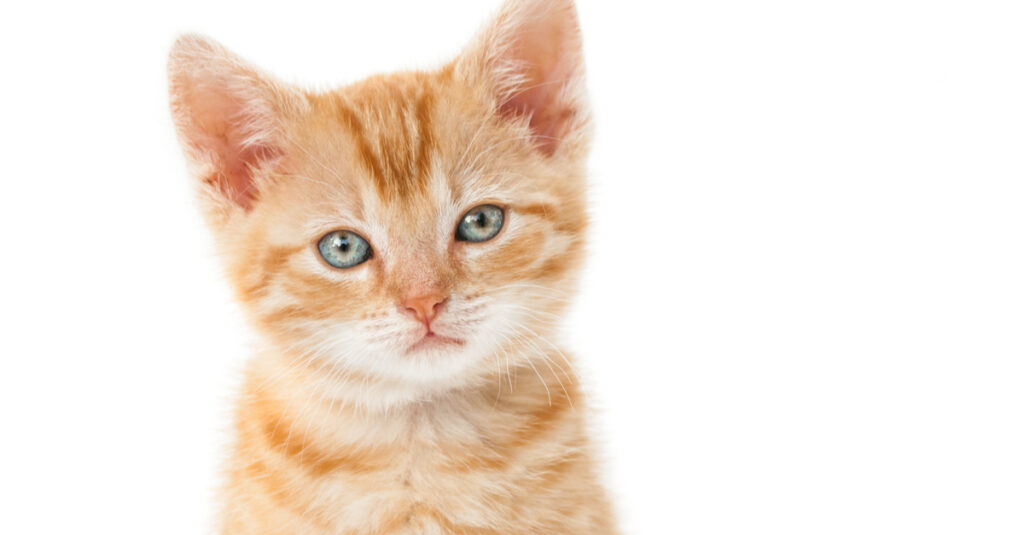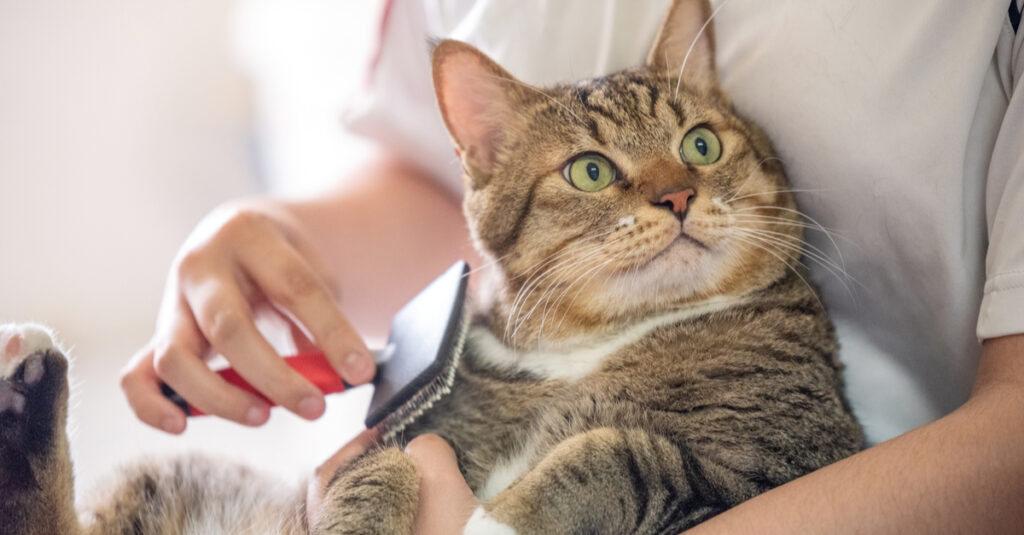When Do Kittens Start Cleaning Themselves?
Kittens are probably one of the most adorable animals on earth, alongside puppies and kittens. But just how do you keep those furry cuties clean?
As you know, so many creatures love to roll around in dirt and mud, and this is also something that kittens do. The question on every kitten owner’s mind is when do kittens start cleaning themselves.
Grab the Puuurrr-fect Planner to keep track of your cat’s health and well-being ON SALE NOW!
There are numerous reasons you may be asking yourself this question. Maybe you have a new cat in the family, and it’s been a few days, but your kitten still isn’t cleaning itself.
Or perhaps you rescued an older cat that used to clean itself just fine, but now won’t.
If you find your new family member is not cleaning themselves, don’t worry. By the time they reach four months old, they should be on the ball with their personal hygiene.
Read also: How To Teach a Kitten To Clean Itself?
When Do Kittens Start Cleaning Themselves?
Kittens begin cleaning themselves at around four to six weeks old, but they still need some outside help from mom to stay clean and tidy.

However, the young ones will begin to groom themselves and each other as a way of building social bonds and learning about their own bodies.
For instance, mother cats lick their kittens’ faces and ears to help them stimulate their brains and motor skills, and kittens imitate that behavior as a way of practicing those skills.
By eight weeks old, kittens will have learned most of the basic grooming behaviors they’ll perform throughout their lives.
Why Does My Cat Clean Herself After I Pet Her?
Cats are really clean animals, as we all know. But for a lot of people, it can be confusing when you pet your cat and then she starts cleaning herself immediately.
Is there something wrong with her? Does she hate your touch?
First, she wants to get rid of the tell-tale human scent. By cleaning herself, she’s clearing away all those pheromones and other smells that come from your hand.
She’s essentially trying to cover up the evidence that she was just with you.
Second, she’s cleaning away any excess oils from your hands, oils that can transfer from your hand onto her fur and skin.
You may not notice them yourself, but your cat can smell them as soon as you’ve touched her.
This is particularly important for cats who spend a lot of time outside, because it reduces the risk of attracting predators based on their smell.
Finally, consider whether your cat cleans herself at the same time every day.
If so, you may find that it’s simply because she has a habit of giving herself a clean up at certain times especially if they occur before certain meals or after naps.
What Does A 6-Week-Old Kitten Look Like?

A six-week-old kitten is about the size of a guinea pig and weighs about one pound.
A 6-week-old kitten is just starting to develop the facial features and adult body shape.
At six weeks old, your kitten’s eyes will be fully open, and their ears should be standing up straight. Their coat may change color, but they won’t look like a full-grown cat yet.
A 6-week-old kitten is called a puller because it has just started pulling itself around.
It may still be pretty wobbly, and it’s not yet able to jump or run, but it will start getting its sea legs soon, and before you know it, you’ll be chasing your active little furball around the house!
They are still very small and have a puppy-like appearance.
At this age, kittens will start to become curious about the world around them, which often involves exploring new places and playing with their littermates or toys.
How To Care for A 6-Week-Old Kitten
When you adopt a 6-week-old kitten, you will need to be very mindful of their safety and health. You should separate the kitten from your other pets for at least 2 weeks to avoid spreading any diseases.
You also need to make sure you have all the supplies you will need to take care of a kitten. One of the most important things to do is ensure that the kitten is well fed and hydrated.
To feed a 6-week-old kitten, use a syringe or nursing bottle and nurse the kitten every 2 hours, following the feeding guidelines on the milk replacement formula.
The mother’s milk or milk replacement formula should account for 80% of their diet, with solid food being introduced at this age. Finally, they should have access to fresh water at all times.
Warm the formula or milk to about 100°F before feeding it to your kittens. Use a dropper, medicine syringe without the needle, or small spoon to feed him.
Read also: How To Get Kitten to Stop Nursing on Sibling
Do not use an eye dropper because it may make him choke. Feed him until he turns away or falls asleep. Here are some tips.
- Feed him in an upright position so he doesn’t have to fight gravity while eating.
- Stroke his throat and body gently so that he swallows during feeding.
- Make sure that his stomach is round after eating but not hard or bloated.
How To Take Care of A 6-Week-Old Kitten Without a Mother
If you’ve found yourself in the position of caring for an orphaned kitten, it can seem like a daunting task.

Kittens that have not yet been weaned need special care during their first weeks of life, but don’t worry! You can provide everything they need.
1. Provide Womb-Like Comfort
Think about how your kitten’s mother would care for her. Providing warmth, comfort, and nourishment.
You can do the same by mimicking your cat’s natural home. For young kittens, place a heating pad under half of the container so that they can move closer to the heat if needed.
2. Cleaning and Bathing
You should clean your kittens with a washcloth or paper towel soaked in warm water whenever they look dirty or after they eat milk.
After cleaning, you should dry them thoroughly with a clean towel or cloth.
You should never bathe kittens until they’re at least 12 weeks old because of their fragile immune systems. Until then, stick to using a damp cloth to clean your kitten.
There are a few essentials that every six-week-old kitten needs. These include.
- Food
- Water
- A safe place to live
- A place to use the bathroom
- Toys to play with
Feeding your kitten is super fun. You don’t even have to make it yourself! At first, the food should be wet, so you can give your kitten formula if it’s not nursing from its mother.
It’s okay for six-week-old kittens to eat solid foods, but they still need some wet food as well. After about eight weeks, though, you can start giving them dry cat food.
Just make sure that the brand is high quality and specifically designed for kittens.
What Do 6-Week-Old Kittens Eat?
6-week-old kittens should still be nursing on their mother, but they may also be ready to start eating solid foods.
The first thing you can offer a kitten at this age is kitten formula, which you can purchase at most pet stores or online.
If you’re adopting a kitten from a shelter or rescue group, they may already have this prepared for you.
At six weeks old, kittens are still too young to eat solid foods or be weaned from their mother’s milk. However, you can still administer solid food in moderations.
Weaning means the process of transitioning from drinking their mother’s milk to eating solid food. The process of weaning usually begins when the kittens are about four weeks old or more.
Other Options You Can Try
- Dry Food
If your cat is still nursing at all, then you will want to make sure that you choose dry food that has small enough pieces for kittens of this age.
The food should be moistened with water and should have a flavor or smell that will appeal to your kitten.
You can also mix in small amounts of canned kitten food with the dry food to make it more appealing.
As your cat gets older and begins eating more solid food, you can start transitioning them away from wet foods completely.
- Human Baby Food
This option is great if your kitten refuses to eat anything else because it is filled with all of the same nutrients as other types of cat food, but it tends to smell better and taste better than other types of cat food.
How To Train A 6-Week-Old Kitten
Kittens are super adorable. They’re little balls of fluff that love to be cuddled and they’re so tiny they fit in the palm of your hand.
But kittens are also a lot of work. They need to be fed, cleaned and taught how to use a litter box. If you want to train your kitten correctly, it’s important to start these lessons from an early age.
Also read: Why is Newborn Kitten Panting?
At six weeks old, kittens are just starting to explore their world, and this is the perfect opportunity for them to learn how to behave in it.
Kittens learn by playing with objects, each other and people. They don’t like being told off for doing something wrong though as this will scare them or make them angry.
So instead, try giving praise when they do something good or give them treats as rewards for listening well.
Positive reinforcement is the best way to train a 6-week-old kitten because it works on rewarding good behavior rather than punishing bad ones, which can have negative effects on your pet’s mood and growth!
The first step in training any pet is making sure their needs are met, food, water, shelter from the cold or heat etc. before starting any type of training routine with them.
7 Steps on How to Train 6-week-Old Kitten
- Keep your kitten in a small area.
When you first bring them home (If you are adopting.) This will give them time to get used to their new surroundings and relax so that they can start learning new things.
2. Start training your kitten with positive reinforcement
Treats or praises are a good example of positive reinforcement, you can always reward your kitty with its favorite treats every time they do something right. And remember to give them lots of praise.
3. Pick a new name for your kitten that you love.
Once you’ve picked it, always call them by their new name. This will help them learn it, and it will be easier to teach them other things later.
4. Get a toy that they like.
move it around in front of them so that they follow it with their eyes, if they do, give them a treat and say good or yes. This way, they’ll learn to associate the positive words with being good.
5. Make sure your cat has a litter box.
Your cat must have its litter box along with some toys that they can play with on their own when they need some time alone or when you need some time alone.
6. Introducing your kitten to other animals and people,
This will help your cat have a greater feeling of association with others. Keep an eye out for signs of stress like pacing or shaking.
If you notice any of these signs in either animal or person, it may be best to wait a while before trying again.
7. Keep training sessions short and sweet!
Repeat the same command over and over until your kitten gets it right, and don’t forget how much more effective positive reinforcement is compared with negative reinforcement like yelling.
Also read: Do Cats Learn From Their Mistakes?
It’s important to have your cat in a safe place while you’re away! If you’re gone for more than three hours at a time, consider getting someone else to check on them or make arrangements for them to stay somewhere.
Conclusion
The youngest kittens will start to clean themselves about four to six weeks into their lives, so around the average time for weaning.
Kittens have some of the most adorable grooming habits, like the little ones that lick their paws clean. But it’s important to let them learn on their own when they’ll be most effective at cleaning themselves.
This will help keep them from overusing their tongues, which can actually cause more dirt and hair build up in their coats.
It also prevents hand-rearing issues like weight gain, bad biting habits, or a dulled sense of smell.
Hopefully, after reading this article you have a better understanding of when kittens begin to clean themselves.
As a reminder, it’s never too late to socialize your kitten. It’s important to start early, but there are many benefits seen from regular socialization of young cats too.
We hope that this post gave you a better understanding of how your kitten develops, and how their behavior evolves in early months.
We recognize how much you love your kitten, and we hope that this knowledge furthers that bond between you two.
And we hope that knowing your kitten is ready to start cleaning themselves will help ease the transition into grooming them, when they start to get a bit of fur on their belly.
Resources:
http://www.petplace.com/cats/orphaned-kitten-care-handfeeding-a-bottlebaby-kitten/page1.aspx
